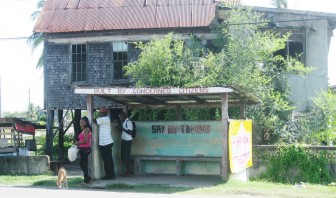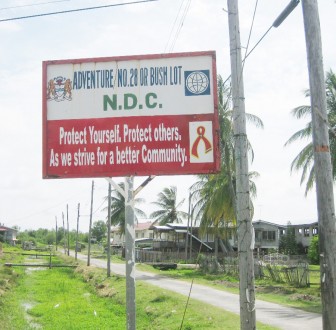Violet Rodrigues, 84, a retired teacher of Kildonan Village, Corentyne who still takes her morning walks to “keep fit” was always actively involved in the development of her community and the youths. When the Sunday Stabroek visited around 8.30 on a Wednesday morning she was relaxing at home after going out at 5 am with a neighbour for her “exercise.” Before returning home that day they sat on the pavilion at the cricket ground “taking some breeze.”
An old multi-purpose centre in the ground had collapsed a few years ago and the Social Impact Amelioration Programme helped to build another one, she said.
Classes were held for school leavers at the centre where Rodrigues taught sewing and home economics. That was after she retired as a school teacher. The building also houses a library and a registration office for the Guyana Elections Commission.
Located on the Corentyne coast, about 17 miles from New Amsterdam, the village has a mosque, a church, a Chinese restaurant, liquor restaurants, grocery shops and a snackette. It also a bus shed where persons could be seen standing awaiting transportation.
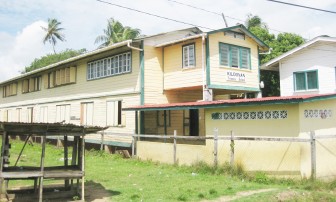
Rodrigues started her teaching career at the Eversham Scots School and spent her final years at Kildonan Primary, located in the nearby Nurney Village and separated from Kildonan by a street.
The school was first built in the village but later moved to Nurney after a larger plot of land was available there.
Kildonan is a mixed community dominated by African-Guyanese, and is known to have many rice, cash crop or dairy farmers. The few rice farmers had already gone to the backdam that morning. The village also has produced a few professionals including a university lecturer, nurses, teachers, police officers and pastor.
Residents said the village offers “true country life… everyone co-operates and shares with each other.”
Rodrigues, fondly called ‘Teacher Punce,’ served as councillor then as chairman of the Bush Lot/Adventure Neighbourhood Democratic Council. During that time, the strict disciplinarian who was born in the village was also “able to get the youngsters” to join the sports club and get involved in games like cricket, football and circle tennis.
Social problems
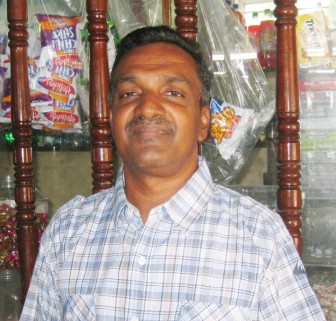
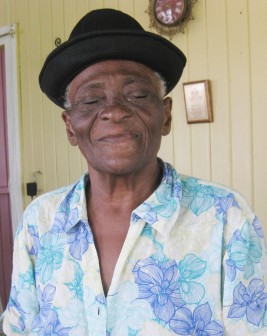
The activities helped to keep them out of trouble, but now she is distressed that there was a breakdown in moral values among the youths. She would still give advice to them when they need it. She also likes “to tell them about the way I grew up with discipline. They would tell me, that was for long-time and I would let them know that the creator is the same…”
Rodrigues lamented that the young generation has no respect for the
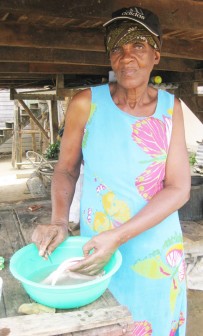
senior citizens. She recalled that “as a child we could not pass the elderly and don’t say ‘howdy.’ Today they use obscene language and I would still admonish them and they would say they’re sorry.” She emphasized too that some of them “would become mothers at a young age when they should be under parental care… Many of the babies are not accepted by their fathers and end up suffering…”
The woman said too that many of the youths in the village are involved in drugs and she would “advise them to stop because their brains would become twisted…”
Cleaning fish
Next door, 70-year-old Themla Hawker who was born and spent all her life in the village was busy cleaning fish to cook that morning. She retired as a cleaner at Kildonan Primary five years ago and now takes care of her grandchildren.
She was looking forward to the grand emancipation celebrations that were expected to be held at the Esplanade Park last Monday, and where the elderly would have danced to the beating of drums.
In another section of the village, next to the mosque, 86-year-old Fatma Prayag was in her yard reaping beans. There were also other vegetable plants around including pepper, thyme and callalu, as well as fruit trees. She said proudly that she planted them herself. Prayag lives alone and still does all of her household chores herself, as well as “look[ing] into the interest at the mosque,” according to a member who was there.
Relatives and members of the mosque would sometimes visit her home to assist with chores. She would also have company at nights to sleep over.
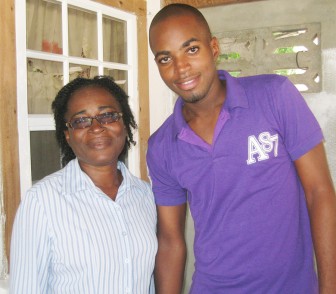
Working hard is nothing new to Prayag. Her husband deserted her after two-and-a-half years of marriage, leaving her to care for their daughter. She continued to live a single life. The woman recalled that she planted rice in the backdam and reaped it “with grass knife.” She also went fishing and planted a cash crop farm and fetched the produce “on my head from the backdam.”
She would also walk to the Port Mourant market a few miles away, in the company of other women and sold her produce before walking back home.
Pastor Quaicy Henry, 39 who works as a meter reader heads the Phillipi Christian Church, a few villages away. When this newspaper caught up with him he was busy working in his yard. His wife, Ventrice, and three of their four sons were also present.
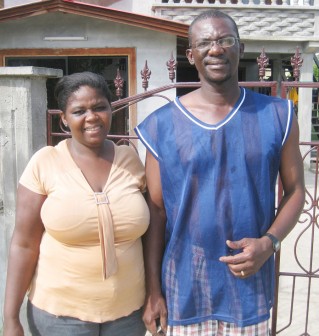
Henry studied theology in St Vincent for two years before becoming a pastor. He also taught at the No 36 Primary, the Central Corentyne Secondary School (CCSS) – his alma mater – and South Ruimveldt Primary.
Across the road from his house, Maureen Bynoe who was born and grew up in the village was preparing to leave home. The woman who comes from “a family of teachers” still took time off to speak to this newspaper. She is a lecturer in Education at the University of Guyana Berbice Campus and is married to Guyana Teachers Union President Colin Bynoe.
Their two children are also teachers; their son, Colin Jr teaches CCSS and their daughter, Carolyn is at Kildonan Primary.
This newspaper also stopped at a shop which offers a wholesale/retail grocery and off-licence take-away liquor services. The business belongs to Ivan Dipnarine who said the village has seen a lot of development over the years. A member of the cricket club, Dipnarine said the ground
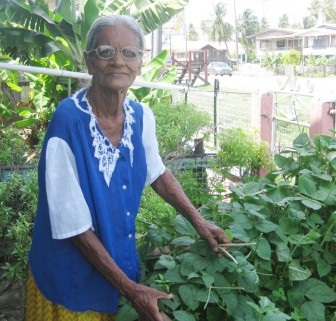
has been damaged because of heavy rainfall. It would be fixed when the weather holds though.
He was also popular in the community as a “champion jockey” in horse-racing while on a contract with Banks DIH Ltd. The father of two now enters two racehorses that he imported from Trinidad, in competitions.
The horses would normally emerge first but at a Digicel sponsored race held at No 6 Village, West Coast Berbice recently, one of the horses came third.
At a small roadside snackette, a resident stopped to purchase a bottle of lemonade which he said was for his “breakfast.” The business is run by Candace Henry. Her reputed husband, Seon Collins who works at the sugar estate as a cane-harvester, also assists her during the out-of-season which is still on. Collins moved to the village from Manchester after meeting Henry three years ago.
Local history
Rodrigues whose great-great grandparents were slaves came along with others via the Berbice River. She learnt that “when the [former] slave masters were selling the estate, the men used to go around with wheelbarrows to collect money and they used it to buy the whole area.”
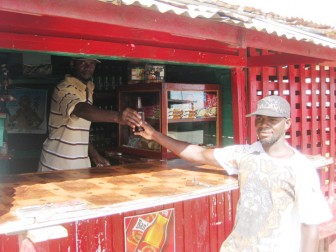
According to her, they built schools and started teaching but they did not give up their culture; “They continued to send messages by beating drums.”
Her ancestors worked at the Port Mourant Estate and “made a note of the English they learnt from the white people. They were very smart. They made a hall where they met and discussed what they learnt.” The woman said too that they “decided to build a church at Auchlyne and they used to go there with donkey carts. The whites were the preachers and they assisted with the schools.”
